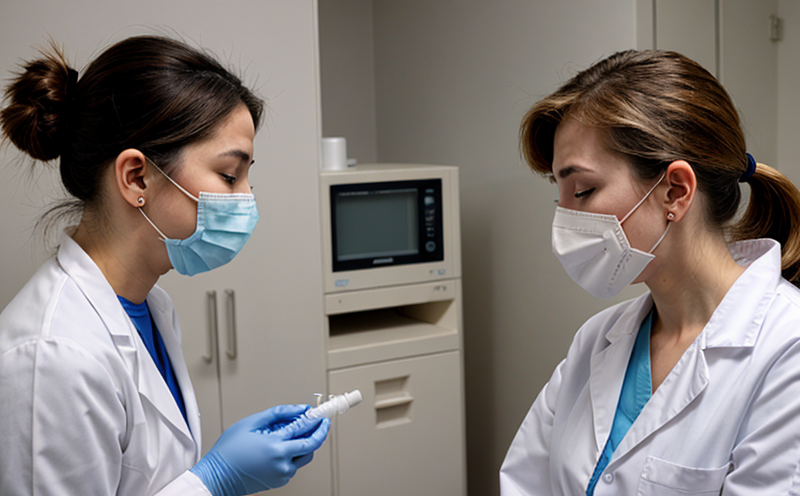Immunoglobulin G (IgG) Testing in Veterinary Research
The role of Immunoglobulin G (IgG) testing in veterinary research is pivotal for understanding immune responses and identifying potential allergens or pathogens. IgG antibodies are the most abundant class of antibodies in blood, and their presence can indicate a current or past infection as well as an allergic response.
In veterinary medicine, IgG testing helps in diagnosing diseases such as parasitic infections, bacterial infections, and immune-mediated conditions. It is particularly useful for identifying specific allergens that may be causing hypersensitivity reactions in pets. The test results can guide the formulation of personalized treatment plans, including dietary restrictions or immunotherapy regimens.
For research purposes, IgG testing aids in studying the efficacy of vaccines and the development of new therapeutics targeting immune disorders. This service is applicable to a wide range of species, from small laboratory animals like mice and rats to larger domesticated animals such as dogs and cats.
The process involves collecting blood samples from the animals, which are then analyzed using standardized protocols that ensure high accuracy and reproducibility. The testing method typically follows international standards such as ISO 15195:2013 or ASTM E691-18, ensuring compliance with industry best practices.
The results of IgG testing provide a comprehensive overview of the immune status of the animal, which can be crucial for both diagnostic and therapeutic purposes. By identifying specific IgG antibodies against certain antigens, researchers can gain insights into the immune system's response to various stimuli, including environmental factors and pathogenic agents.
Moreover, IgG testing is instrumental in assessing the immunocompetence of animals used in research settings. This ensures that the animals are not only healthy but also suitable for use in specific experimental protocols. The test can help in selecting appropriate models for studying immune-related diseases or evaluating the effectiveness of new treatments.
Understanding the nuances of IgG testing is essential for veterinarians and researchers working in this field. It allows for more precise diagnoses and treatment strategies, ultimately improving animal welfare and research outcomes.
| Scope | Methodology |
|---|---|
| Collection of blood samples from animals | Analysis using standardized protocols following ISO and ASTM standards |
| Detection of specific IgG antibodies against antigens | Evaluation of immune status for diagnostic and therapeutic purposes |
Scope and Methodology
The scope of the IgG testing service encompasses the collection, processing, and analysis of blood samples from various animal species. The methodology adheres strictly to international standards to ensure accuracy and reliability.
- Blood sample collection: This involves drawing blood under aseptic conditions using appropriate needles and vacutainers.
- Sample preparation: Blood is separated into serum through centrifugation, which is then used for the IgG testing.
- Antibody detection: The use of ELISA (Enzyme-Linked Immunosorbent Assay) or IIF (Indirect Immunofluorescence) techniques to detect specific IgG antibodies against target antigens.
| Sample Collection | Sample Preparation | Antibody Detection |
|---|---|---|
| Blood drawing under aseptic conditions | Centrifugation to separate serum | ELISA or IIF for antibody detection |
Eurolab Advantages
At Eurolab, we pride ourselves on providing top-tier IgG testing services tailored specifically to the needs of veterinary researchers and clinicians. Our team is composed of experienced professionals who are committed to delivering accurate and reliable results.
We offer rapid turnaround times for our tests, ensuring that you receive your results promptly. This timely delivery allows for quicker decision-making processes in both diagnostic and therapeutic contexts.
Our state-of-the-art laboratories use the latest technology and equipment, which guarantees consistent and precise test results. We also provide detailed reports that include all relevant data points, making it easier for researchers to interpret and act upon their findings.
We are dedicated to maintaining high standards of quality assurance and control throughout our entire process. This commitment ensures that every sample undergoes rigorous testing procedures before final results are released. Our approach not only enhances the reliability of our services but also fosters trust between us and our clients.
Environmental and Sustainability Contributions
At Eurolab, we recognize the importance of sustainability in all aspects of our operations. Our IgG testing service contributes positively to environmental stewardship by minimizing waste generation and promoting efficient resource use.
- Minimizing chemical usage: We employ minimal amounts of reagents and solvents that are environmentally friendly and biodegradable.
- Recycling materials: All disposable items used in the testing process are properly recycled, reducing landfill contributions.
- Eco-friendly packaging: Our laboratory uses eco-friendly packaging materials for shipping samples to ensure they remain secure during transit without harming the environment.
We believe that every small step taken towards sustainability collectively makes a significant impact. By incorporating these practices into our daily operations, we aim to contribute positively to environmental conservation efforts while maintaining high-quality service standards.





